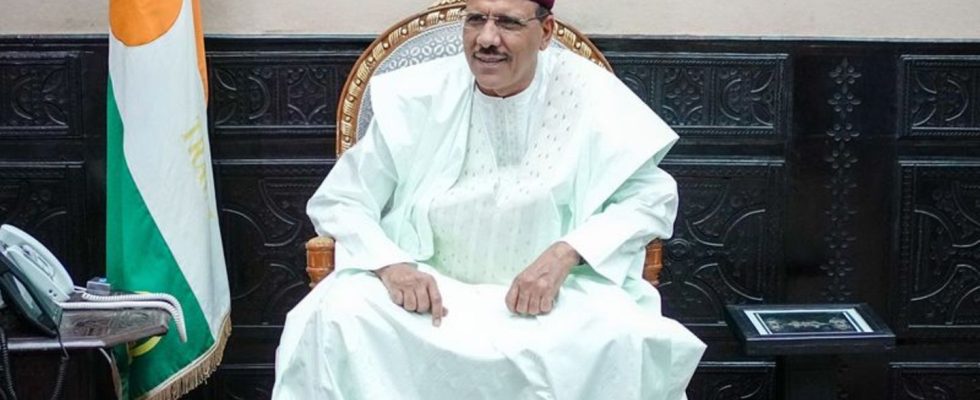West Africa
Big concerns about ousted President Bazoum in Niger
Mohamed Bazoum, 63, his wife and son have been held at their residence for 16 days. photo
© Kay Nietfeld/dpa
According to Nigeria’s president, violence is “the last resort” – but the West African states have activated an intervention force. Meanwhile, the junta is holding the deposed president and his family hostage.
A good two weeks after the military coup in Niger, tensions between the junta and neighboring West African countries continue to rise. It is unclear whether the Ecowas international community will resort to military means to free the detained President Free Mohamed Bazoum and his family.
The Ecowas heads of state decided on Thursday evening to set up a task force “immediately” to restore constitutional order in Niger, but stressed that peaceful means would remain the priority. According to US reports, the coup leaders in Niger have threatened to kill Bazoum if military intervention occurs.
The military took power in Niger on July 26 and suspended the constitution. The democratically elected President Bazoum has been held since then. Under Bazoum, Niger was one of the West’s last remaining strategic partners in the fight against the advance of Islamist terrorists in the Sahel. The country – three and a half times the size of Germany – is also on a central migration route through the Sahara desert to Libya. The Bundeswehr maintains a base in the capital Niamey with around 100 soldiers. The USA and France also have important military bases in the country.
Lots of questions about possible military action
The ambivalent announcement of Ecowas initially raised many questions. Although Ecowas spoke of the use of the task force, but gave no details on the composition of the force or a possible timetable for a deployment. The announcement seemed designed to keep up the pressure on the new military rulers – without immediately creating military facts.
“The statement did not specify which countries would send troops and fund the mission, meaning the formation of such a force takes time and leaves room for a peaceful solution,” said West Africa analyst Mucahid Durmaz of consulting firm Verisk Maplecroft .
Of the 15 ECOWAS member states, only Nigeria, Senegal, Ivory Coast and Benin had previously agreed to provide troops for a possible military intervention. Experts say Nigeria, Africa’s most populous country with 220 million people, would probably provide the bulk of such a force. The country may have one of the largest armies in Africa, but it is battling enormous security problems of its own, especially in the region along the 1,600-kilometer border with Niger. The military governments in Mali and Burkina Faso had signaled their support to the junta in Niger when Ecowas attacked.
Ecowas has carried out interventions in the past, but always acted at the invitation of the respective state, as most recently in Gambia in 2017. The tools of such intervention forces are regulated between the African Union and the respective regional blocs, but are linked to scenarios such as preventing serious human rights violations.
“We’re in really uncharted territory here. There’s no precedent for what Ecowas is trying to do and it’s certainly not something this riot force was ever trained to do,” said Cameron Hudson, Africa analyst at the Center for Strategic and International Studies , the US broadcaster CNN. “We’re talking about a hostage situation where the president of the country is essentially being held as a human shield against this military intervention. So we’re talking about going in, somehow rescuing him, and then reinstating him against the will of the entire national army. ” The putschists would certainly have a certain amount of support among the population.
Concerns about ousted President Bazoum
Meanwhile, concerns about the ousted President Bazoum are growing. The 63-year-old has been held at his residence for 16 days. The junta is said to have threatened a US diplomat that Bazoum would be killed in the event of a military intervention, the New York Times reported on Friday based on a report by the US news agency Associated Press. The threat sparked global outrage and further calls for Bazoum’s release.
“After he was deprived of electricity and telephone for several days, the putschists are now depriving him of his family doctor, among other things. He is even denied access to food,” Bazoum’s deputy chief of cabinet Moussa Oumarou told the German Press Agency on Friday. His wife and son are also being held. According to Oumarou, the putschists arrested around 100 members of the ousted government, including the son of former President Mahamadou Issoufou. According to UN Human Rights Commissioner Volker Türk, the conditions under which Bazoum is being held could constitute a violation of international human rights law.
The African Union said it supports the West African group of nations Ecowas’ efforts to restore constitutional order and has reiterated its call for the immediate release of Bazoum and all members of his family and government.
Schulze continues to hope for a peaceful solution
Federal Development Minister Svenja Schulze still believes that a peaceful solution to the overthrow in Niger is possible. “No one has died in this coup so far,” said the SPD politician on Deutschlandfunk on Friday.
“We know that differently from other coups. And that’s why I still see a possibility that there will be peaceful solutions if the pressure is really big enough.” Foreign Minister Annalena Baerbock also welcomed Ecowas’s diplomatic efforts on Friday, without mentioning the immediate establishment of a multinational intervention force. It is in the interests of the entire region that the putschists embark on mediation efforts.

